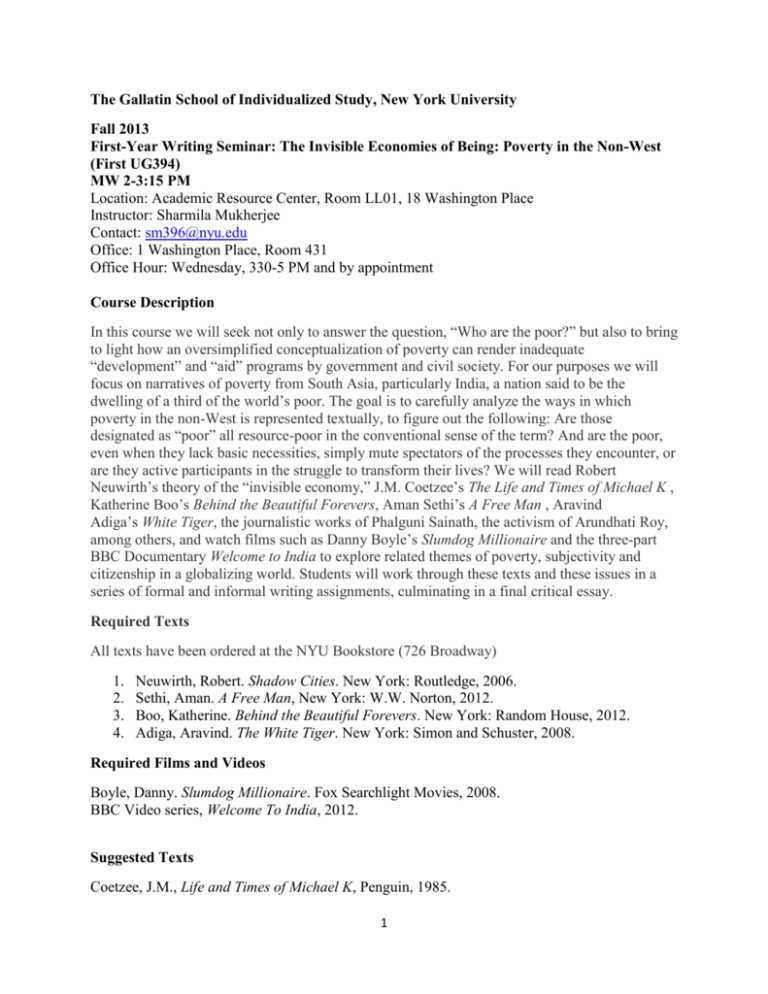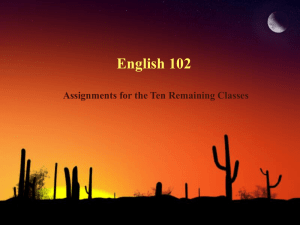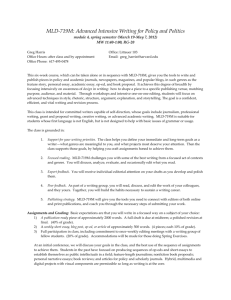First UG394 - Gallatin School of Individualized Study
advertisement

The Gallatin School of Individualized Study, New York University Fall 2013 First-Year Writing Seminar: The Invisible Economies of Being: Poverty in the Non-West (First UG394) MW 2-3:15 PM Location: Academic Resource Center, Room LL01, 18 Washington Place Instructor: Sharmila Mukherjee Contact: sm396@nyu.edu Office: 1 Washington Place, Room 431 Office Hour: Wednesday, 330-5 PM and by appointment Course Description In this course we will seek not only to answer the question, “Who are the poor?” but also to bring to light how an oversimplified conceptualization of poverty can render inadequate “development” and “aid” programs by government and civil society. For our purposes we will focus on narratives of poverty from South Asia, particularly India, a nation said to be the dwelling of a third of the world’s poor. The goal is to carefully analyze the ways in which poverty in the non-West is represented textually, to figure out the following: Are those designated as “poor” all resource-poor in the conventional sense of the term? And are the poor, even when they lack basic necessities, simply mute spectators of the processes they encounter, or are they active participants in the struggle to transform their lives? We will read Robert Neuwirth’s theory of the “invisible economy,” J.M. Coetzee’s The Life and Times of Michael K , Katherine Boo’s Behind the Beautiful Forevers, Aman Sethi’s A Free Man , Aravind Adiga’s White Tiger, the journalistic works of Phalguni Sainath, the activism of Arundhati Roy, among others, and watch films such as Danny Boyle’s Slumdog Millionaire and the three-part BBC Documentary Welcome to India to explore related themes of poverty, subjectivity and citizenship in a globalizing world. Students will work through these texts and these issues in a series of formal and informal writing assignments, culminating in a final critical essay. Required Texts All texts have been ordered at the NYU Bookstore (726 Broadway) 1. 2. 3. 4. Neuwirth, Robert. Shadow Cities. New York: Routledge, 2006. Sethi, Aman. A Free Man, New York: W.W. Norton, 2012. Boo, Katherine. Behind the Beautiful Forevers. New York: Random House, 2012. Adiga, Aravind. The White Tiger. New York: Simon and Schuster, 2008. Required Films and Videos Boyle, Danny. Slumdog Millionaire. Fox Searchlight Movies, 2008. BBC Video series, Welcome To India, 2012. Suggested Texts Coetzee, J.M., Life and Times of Michael K, Penguin, 1985. 1 All other readings and videos will be made available by Instructor as and when required. Course Objectives and Learning Goals By the end of this course your work should indicate that you can: (1) Intelligently analyze not only traditional academic and literary sources but also other cultural materials (film, song, etc.). (2) Experiment with new ideas in class discussion and engage with your classmates’ ideas in a respectful, productive manner. (3) Employ a critical vocabulary appropriate for the evaluation of the various course material (print materials, film, song). (4) Outline, draft, and edit your own academic essays and assist your peers with their drafting processes. (5) Develop a clear thesis with a well-supported argument that incorporates the assigned materials. (6) Follow MLA citation format. Course Policies It is essential that you attend class regularly, arrive promptly, and submit all work on time. It is also essential that you contribute meaningfully to class discussions. If you need an extension, let me know ahead of time so that we can make arrangements. Late papers will be progressively downgraded. Participation—both in class discussion and in smaller group work—is an important part of your course grade. Please come to class prepared to ask questions, to comment, to fully engage. You must bring the assigned readings to each class meeting. Please make sure to turn off all cell phones before class begins. Plagiarism: Any and all work you hand in this semester must be your own. Whenever you use someone else’s words or ideas, you must cite them properly. Per official school policy: “As a Gallatin student you belong to an interdisciplinary community of artists and scholars who value honest and open intellectual inquiry. This relationship depends on mutual respect, responsibility, and integrity. Failure to uphold these values will be subject to severe sanction, which may include dismissal from the University. Examples of behaviors that compromise the academic integrity of the Gallatin School include plagiarism, illicit collaboration, doubling or recycling coursework, and cheating. Please consult the Gallatin website www.gallatin.nyu.edu/academics/policies/policy/integrity.html for a full description of the academic integrity policy. Please do not hesitate to let me know if you have any questions or concerns. I am glad to meet with you to discuss all assignments or any other aspect of the course. 2 COURSE REQUIREMENTS Response papers: About a page on assigned reading, to be posted on NYUClasses. The response is a close and reflective reading of a particularly striking textual moment and will be used as a way of sparking and focusing our discussions. They will also direct our conversations about writing; as such, your reflections should stake out an argumentative position, organized in clear paragraphs. It is everyone’s responsibility to become familiar with all submitted reflections as part of preparations for class. You are expected to comment on at least one reflection on those days when you have not posted one. This must be done by noon of the day after discussion. You will also be responsible for four formal essays in the course of the semester. We will approach writing as a process, and a rough draft of each paper will be work shopped. You must be prepared to bring several copies of your work to class on designated days; your participation in the workshops is essential and will be part of your grade for the paper. You will submit an official draft of each paper following the workshop. You will have the opportunity to revise the first three graded papers should you wish to do so. The submitted draft of each paper must be accompanied by a reflection on the writing and revision process, articulating your goals for and concerns about the paper, as well as a careful consideration of the choices you made in accomplishing these goals and addressing these concerns. All papers—including the writing and revision reflection—must be submitted electronically as Word Doc files; the file name must be “LastName EssayNumber DraftNumber.” Please submit papers by 12 PM on the date due. PLEASE NOTE: Late papers will be marked down half a grade for each day after the due date. FORMAL WRITING ASSIGNMENTS The FIRST PAPER will be a 3-4 page close reading. You will be asked to discuss a particular line/image/passage in relation to the work of which it is part, to consider its significance in relation to the whole, and discuss its contribution to the work’s meaning. The SECOND PAPER will be a 4-5 page analysis of a significant discourse at work in your chosen text. That is, you will need to identify a particular belief or set of beliefs that makes meaning possible and structures the text. Put another way, the central issues you will want to grapple with here are about the social debate the work is participating in. The THIRD PAPER will be a 4-6 page analysis of multiple texts, bound by a similar concern, in relation to each other. How you define the concern is entirely up to you, though part of the assignment is to make this definition clear. Bonus points for unexpected (but justified) pairings. The FOURTH PAPER TBA A Few More Things to Keep in Mind: In-class writing: We’ll be doing a lot of it, and I’ll ask you to do this the old-fashioned way: with paper and pen. So please leave laptops, tablets, and cell phones in their cases during class meetings. Saving copies of your work: Please always keep a back-up copy of everything you write for the class. 3 Arriving: We’ll start class right on time. If you arrive late, please wait until she/he is finished, then come in quietly. Your final course grade will be based on: Participation: 15% Reflections: 15% Essays: 70% Grades Your final drafts will be evaluated and graded using the following guidelines: *A* papers raise insightful questions and generate focused arguments that are well supported with evidence, logic, and analysis. Arguments are sufficiently developed through appropriate use of sources with a strong sense of purpose. A papers are organized reasonably, and their prose is clear. There are few if any illogical or confusing moments. A papers also contain very few if any failures of grammar or citation. *B* papers make clear and logical arguments, demonstrate competent engagement with sources, and are generally well-structured and readable. They may suffer from several illogical or confusing passages, some lack of evidence, or some disorganization, or a general lack of development, but not all of these. B papers contain few failures of grammar or citation. *C* papers either have a clear central claim, though it may be shallow or insufficiently supported, or visibly work toward a central claim through meaningful textual analysis. C papers may lack focus, contain several illogical or confusing moments, be disorganized, lack evidence, or some combination of these. C papers may contain some failures of grammar and citation. *D* papers are either missing central claims or they are essentially unsupported. D papers are typically organized in a confusing manner; there is not a clear sense of rationale for paragraphing, order, or material presented. Supporting claims, paragraphs, and analysis do not serve to further the primary aims of the essay, though there may be a strong moment within the essay. Prose is often weak to the point where meaning is not clear. *F* papers demonstrate failure to successfully engage with the assignment or writing task. In F papers the writer may not have addressed the assignment in terms of content, length, deadlines, or other requirements. Writing Center If you need additional help with your writing, you can contact the Gallatin Writing Center at 1 Washington Place, room 423. See www.nyu.edu/gallatin/writingschedule for instructions on how to make an appointment. 4 Reading and Assignment Schedule This may be subject to changes as we move through the semester. You will be notified of any changes. Wednesday, September 4 Introduction Monday, September 9 Read and Discuss, Robert Neuwirth’s Shadow Cities The Preface, The Prologue and the segment “Time Present” (Pgs 25-143) Wednesday, September 11 Read and Discuss, Neuwirth’s Shadow Cities (Pgs 177-205) Monday, September 16 Read and Discuss, Neuwirth’s Shadow Cities (Pgs 241-309) Wednesday, September 18 Preparing for Essay 1 Monday, September 23 Draft of Essay 1 Due Wednesday, September 25 Reading the Journalism and Activism of Phalguni Sainath and Arundhati Roy Monday, September 30 Read and Discuss Aman Sethi’s “A Free Man” Wednesday, October 2 Read and Discuss Aman Sethi’s “A Free Man” First Essay due Monday, October 7 Read and Discuss Aravind Adiga’s “The White Tiger” Wednesday, October 9 5 Read and Discuss Aravind Adiga’s “The White Tiger” Monday, October 14 Generating topics for Essay 2 Fall Break, No Class Wednesday, October 18 Draft of Essay 2 Monday, October 21 Read and Discuss Katherine Boo’s “Behind the Beautiful Forevers” Wednesday, October 23 Read and Discuss Katherine Boo’s “Behind the Beautiful Forevers” Final Essay 2 Due Monday, October 28 Read and Discuss Katherine Boo’s “Behind the Beautiful Forevers” Wednesday, October 30 Read and Discuss Katherine Boo’s “Behind the Beautiful Forevers” Monday, November 4 Discuss BBC 3 part video, “Welcome to India” Wednesday, November 6 Discuss Danny Boyle’s “Slumdog Millionaire” Monday, November 11 Discussing and Interpreting texts in tandem Wednesday, November 13 Preparing for Essay 3 Monday, November 18 Draft of Essay 3 6 Wednesday, November 20 TBA Monday, November 25 Essay 3 Due Wednesday, November 27 TBA Thursday, November 28-Sunday, December 1 Thanksgiving Break Monday, December 2 Preparing for Essay 4 Wednesday, December 4 Draft of Essay 4 Monday, December 9 Revisiting the Question of Poverty Wednesday, December 11 Essay 4 Due 7





